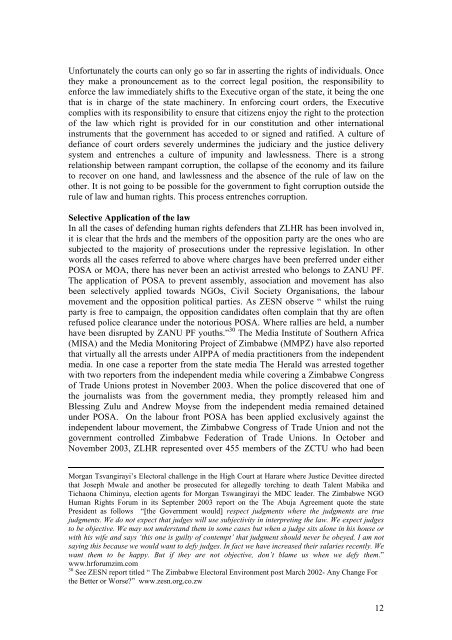overview of the human rights situation in zimbabwe - Kubatana
overview of the human rights situation in zimbabwe - Kubatana
overview of the human rights situation in zimbabwe - Kubatana
You also want an ePaper? Increase the reach of your titles
YUMPU automatically turns print PDFs into web optimized ePapers that Google loves.
Unfortunately <strong>the</strong> courts can only go so far <strong>in</strong> assert<strong>in</strong>g <strong>the</strong> <strong>rights</strong> <strong>of</strong> <strong>in</strong>dividuals. Once<br />
<strong>the</strong>y make a pronouncement as to <strong>the</strong> correct legal position, <strong>the</strong> responsibility to<br />
enforce <strong>the</strong> law immediately shifts to <strong>the</strong> Executive organ <strong>of</strong> <strong>the</strong> state, it be<strong>in</strong>g <strong>the</strong> one<br />
that is <strong>in</strong> charge <strong>of</strong> <strong>the</strong> state mach<strong>in</strong>ery. In enforc<strong>in</strong>g court orders, <strong>the</strong> Executive<br />
complies with its responsibility to ensure that citizens enjoy <strong>the</strong> right to <strong>the</strong> protection<br />
<strong>of</strong> <strong>the</strong> law which right is provided for <strong>in</strong> our constitution and o<strong>the</strong>r <strong>in</strong>ternational<br />
<strong>in</strong>struments that <strong>the</strong> government has acceded to or signed and ratified. A culture <strong>of</strong><br />
defiance <strong>of</strong> court orders severely underm<strong>in</strong>es <strong>the</strong> judiciary and <strong>the</strong> justice delivery<br />
system and entrenches a culture <strong>of</strong> impunity and lawlessness. There is a strong<br />
relationship between rampant corruption, <strong>the</strong> collapse <strong>of</strong> <strong>the</strong> economy and its failure<br />
to recover on one hand, and lawlessness and <strong>the</strong> absence <strong>of</strong> <strong>the</strong> rule <strong>of</strong> law on <strong>the</strong><br />
o<strong>the</strong>r. It is not go<strong>in</strong>g to be possible for <strong>the</strong> government to fight corruption outside <strong>the</strong><br />
rule <strong>of</strong> law and <strong>human</strong> <strong>rights</strong>. This process entrenches corruption.<br />
Selective Application <strong>of</strong> <strong>the</strong> law<br />
In all <strong>the</strong> cases <strong>of</strong> defend<strong>in</strong>g <strong>human</strong> <strong>rights</strong> defenders that ZLHR has been <strong>in</strong>volved <strong>in</strong>,<br />
it is clear that <strong>the</strong> hrds and <strong>the</strong> members <strong>of</strong> <strong>the</strong> opposition party are <strong>the</strong> ones who are<br />
subjected to <strong>the</strong> majority <strong>of</strong> prosecutions under <strong>the</strong> repressive legislation. In o<strong>the</strong>r<br />
words all <strong>the</strong> cases referred to above where charges have been preferred under ei<strong>the</strong>r<br />
POSA or MOA, <strong>the</strong>re has never been an activist arrested who belongs to ZANU PF.<br />
The application <strong>of</strong> POSA to prevent assembly, association and movement has also<br />
been selectively applied towards NGOs, Civil Society Organisations, <strong>the</strong> labour<br />
movement and <strong>the</strong> opposition political parties. As ZESN observe “ whilst <strong>the</strong> ru<strong>in</strong>g<br />
party is free to campaign, <strong>the</strong> opposition candidates <strong>of</strong>ten compla<strong>in</strong> that thy are <strong>of</strong>ten<br />
refused police clearance under <strong>the</strong> notorious POSA. Where rallies are held, a number<br />
have been disrupted by ZANU PF youths.” 30 The Media Institute <strong>of</strong> Sou<strong>the</strong>rn Africa<br />
(MISA) and <strong>the</strong> Media Monitor<strong>in</strong>g Project <strong>of</strong> Zimbabwe (MMPZ) have also reported<br />
that virtually all <strong>the</strong> arrests under AIPPA <strong>of</strong> media practitioners from <strong>the</strong> <strong>in</strong>dependent<br />
media. In one case a reporter from <strong>the</strong> state media The Herald was arrested toge<strong>the</strong>r<br />
with two reporters from <strong>the</strong> <strong>in</strong>dependent media while cover<strong>in</strong>g a Zimbabwe Congress<br />
<strong>of</strong> Trade Unions protest <strong>in</strong> November 2003. When <strong>the</strong> police discovered that one <strong>of</strong><br />
<strong>the</strong> journalists was from <strong>the</strong> government media, <strong>the</strong>y promptly released him and<br />
Bless<strong>in</strong>g Zulu and Andrew Moyse from <strong>the</strong> <strong>in</strong>dependent media rema<strong>in</strong>ed deta<strong>in</strong>ed<br />
under POSA. On <strong>the</strong> labour front POSA has been applied exclusively aga<strong>in</strong>st <strong>the</strong><br />
<strong>in</strong>dependent labour movement, <strong>the</strong> Zimbabwe Congress <strong>of</strong> Trade Union and not <strong>the</strong><br />
government controlled Zimbabwe Federation <strong>of</strong> Trade Unions. In October and<br />
November 2003, ZLHR represented over 455 members <strong>of</strong> <strong>the</strong> ZCTU who had been<br />
Morgan Tsvangirayi’s Electoral challenge <strong>in</strong> <strong>the</strong> High Court at Harare where Justice Devittee directed<br />
that Joseph Mwale and ano<strong>the</strong>r be prosecuted for allegedly torch<strong>in</strong>g to death Talent Mabika and<br />
Tichaona Chim<strong>in</strong>ya, election agents for Morgan Tswangirayi <strong>the</strong> MDC leader. The Zimbabwe NGO<br />
Human Rights Forum <strong>in</strong> its September 2003 report on <strong>the</strong> The Abuja Agreement quote <strong>the</strong> state<br />
President as follows “[<strong>the</strong> Government would] respect judgments where <strong>the</strong> judgments are true<br />
judgments. We do not expect that judges will use subjectivity <strong>in</strong> <strong>in</strong>terpret<strong>in</strong>g <strong>the</strong> law. We expect judges<br />
to be objective. We may not understand <strong>the</strong>m <strong>in</strong> some cases but when a judge sits alone <strong>in</strong> his house or<br />
with his wife and says ‘this one is guilty <strong>of</strong> contempt’ that judgment should never be obeyed. I am not<br />
say<strong>in</strong>g this because we would want to defy judges. In fact we have <strong>in</strong>creased <strong>the</strong>ir salaries recently. We<br />
want <strong>the</strong>m to be happy. But if <strong>the</strong>y are not objective, don’t blame us when we defy <strong>the</strong>m.”<br />
www.hrforumzim.com<br />
30 See ZESN report titled “ The Zimbabwe Electoral Environment post March 2002- Any Change For<br />
<strong>the</strong> Better or Worse?” www.zesn.org.co.zw<br />
12
















